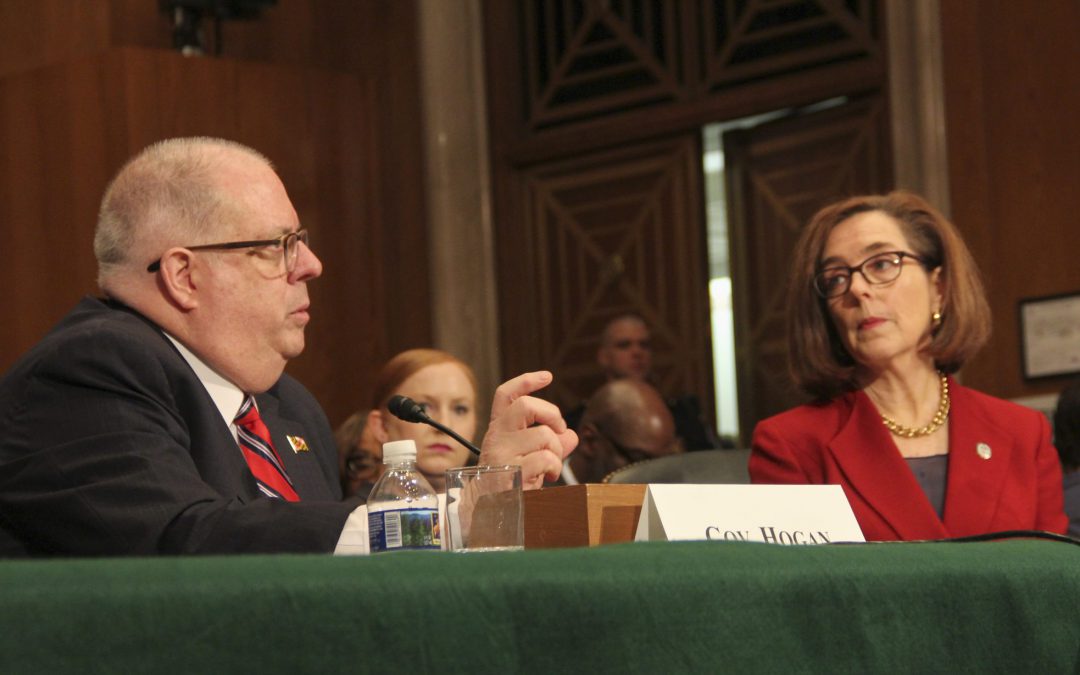WASHINGTON — Touting Oregon’s efforts to combat the opioid crisis, Gov. Kate Brown told a Senate committee Thursday that states need the federal government to step up its efforts by providing more money and moving beyond punishment of drug users to prevention.
“Right now, the federal government recognizes the problem but is focused on punishment,” Brown said. “That leaves us — the states — to right the wrongs of a war on drugs.”
Testifying before the Senate Health, Education, Labor and Pensions Committee, Brown suggested federal health officials should take three approaches: improving data sharing between federal and state authorities, rejecting the punitive approach to addiction and making generic overdose prevention drugs more available.
Sen. Johnny Isakson, R-Ga., agreed prevention is just “as important as enforcing the law to arrest people.” He lost his grandson to addiction in 2016.
“I lost my oldest grandchild to an overdose the day before he was to receive his summa cum laude diploma from Georgia Southern University in mathematics,” Isakson said.
“He had had a problem. It had been years ago, he had been clean, he’d done everything he needed to do, he’d rehabilitated — and then one exposure took his life.”
Isakson also pushed for better education about the dangers of opioids, calling it “the key” in combating the crisis and citing his experience with pain management after back surgery.
“Fortunately, I’d heard everything that was going on up here, so I knew a lot of things to do and not to do,” Isakson said. “Tylenol worked pretty doggone well, and hydrocodone can kill you.”
In response, Brown said Oregon is focusing on education and prevention and that additional federal resources “would be extremely useful.”
“We want to make sure that our students have access to comprehensive mental health services, behavioral health services, in every single school across the state of Oregon,” Brown said. “These drugs are coming on so quickly and they’re so dangerous that it’s hard to get the word out.”
Brown also cited a new state program that ensures a “warm hand-off” by having a peer mentor for opioid users in the emergency room to prevent relapses.
“Folks go into emergency rooms having overdosed, we having just saved their lives, and what I’ve heard is they go to the next room, the next bathroom, and end up using right away,” she said. “We can have a peer mentor in the emergency rooms to help people get directly into treatment and recovery.”
Brown also stressed the importance of access to adequate treatment programs, saying a residential program helped her stepchild recover from his addiction, but only after a long battle with her insurance company to ensure it would cover the costs.
“My stepchild started abusing drugs in high school,” Brown said. “He needed an immersive treatment program, but our insurance policy stood in the way. He had to go through two separate outpatient and inpatient treatments — and relapses — before our insurance would cover the residential program he desperately needed.”
Sen. Elizabeth Warren, D-Mass., said drug companies created the opioid crisis and should be held accountable. She cited a case involving Insys Therapeutics, which developed a fentanyl spray that was only approved for cancer patients in severe pain by the Food and Drug Administration.
“It turns out there just weren’t enough of these cancer patients for the company to make buckets of money,” Warren said. “And so it started illegally marketing the drug to people with milder forms of pain and bribing doctors to over-prescribe it.”
Oregon, along with many other states, sued Insys. In 2015, Oregon was the first to reach a settlement.
“We received a little over a million dollars,” Brown said. “Over half of it went directly to opioid, substance abuse treatment and recovery. A portion of it went to Oregon Health Sciences University.”
Responding to a question from Warren, Brown said that in cases like Insys, she supports punishing the executives of drug companies.
Committee Chairman Sen. Lamar Alexander, R-Tenn., said it will send legislation to combat the crisis to the full Senate for a vote soon.



